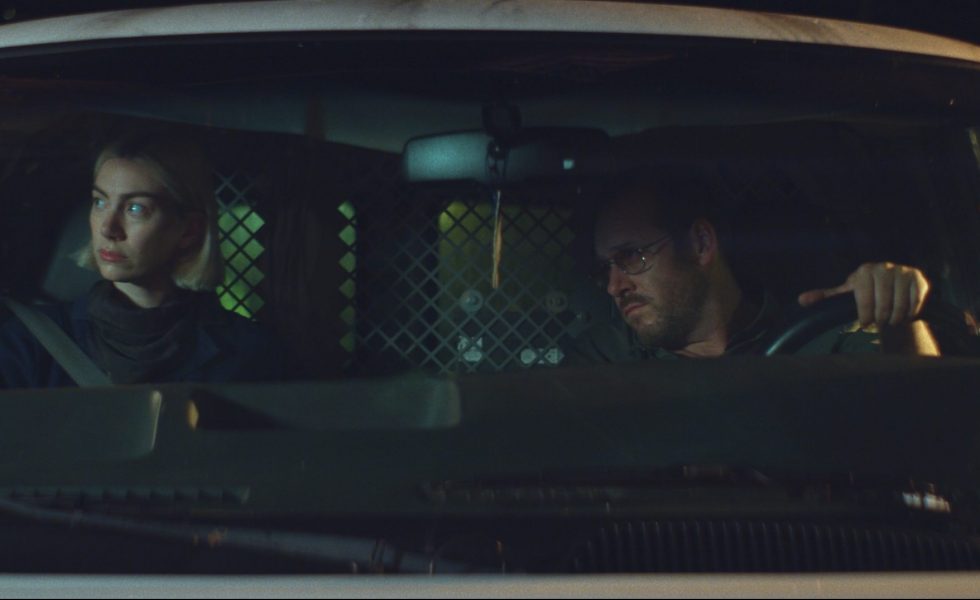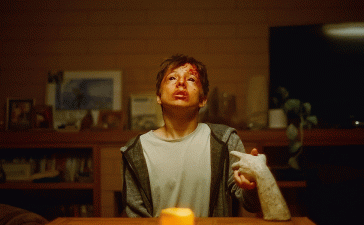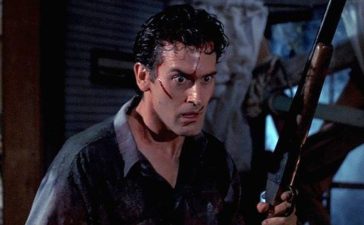In the world of Lapsis, the switch to quantum computing has opened up a new sector of the gig economy: laying fibreoptic cables across all corners of the world. It looks like a good gig to the impoverished Ray (Dean Imperial); he needs to pay for his younger brother’s medical bills, and a little grit and luck could net him big bucks.
Once he takes on the job, however, it’s a different story: walking through trackless miles of forest unrolling a reel of cable is not only gruelling for the flabby, middle-aged Ray, he’s in competition with both more experienced cablers and a tireless little spiderlike robot that dogs his path – if it overtakes him, he loses his route. Even weirder, the fake electronic ID he used to get the job used to belong to someone else and is loaded with points that give him a serious edge. Where did that come from? And what does it portend?
A sly, satirical slice of lo-fi sci-fi, Lapsis comes to us from writer and director Noah Hutton. For a relatively cheap venture, the film is thematically ambitious, taking swings at the tech sector, the gig economy, class conflict, MLMs, and more. We sat down with Noah to try and unpack it.
What inspired you to create Lapsis? What was the seed from which the film sprang forth?
I think it was my own experience working for a decade as an independent contractor, a freelancer experiencing that treadmill of working gig to gig, and not necessarily having healthcare, and having to buy your own equipment, and feeling what I think a lot of people in the last decade have felt with that sort of lifestyle; being on your own and feeling the promise of flexibility, but also the perils of not having that safety net if anything goes wrong.
So that was the modern condition I wanted to explore in the film but given the sort of world-building and the sci-fi elements of it, it takes that and runs in an invented direction with it. It’s not exactly the gig economy, as we know it, it’s this new sector of work: quantum cabling.
Now, the gig economy has been on everyone’s mind for the past several years and I guess there could have been a space to explore these themes in a contemporary drama, so what made you want to work in the science fiction idiom?
I think science fiction is a wonderful way to take our world and turn a mirror on it from one step to the side or in the future. This film? We call it an alternate present: it’s not necessarily in the future, nor is it in the past, but I think viewers might experience both a retro feel to the film and something futuristic about this quantum internet, which might be around the corner. I think science fiction is a great way to comment on our current world, but from this place of sort of allegory or parable, which is one step removed.
I think it was Ray Bradbury who said that science fiction is about how technology affects people. You can change one thing and then you can extrapolate outwards, and that’s what you do here, which I find really interesting. When you were developing the film, was it story first or setting first, or did they evolve organically together?
Before I even came up with the world of Lapsis or cabling or any of the trappings of the film, I started wanting to tell a story about someone who gets a head start, somebody who gets something plopped into their lap that they know nothing about: they didn’t ask for it and it’s sort of a surprise to them and they’re just saddled with a head start. What do they do with it? Do they use it for themselves to get rich and get out or do they use it to help the larger collective that they’re part of? That was the story I wanted to tell. But, of course, the world went in all sorts of directions that were inspired by things about our world and our gig economy.
What other films or filmmakers inspired you?
I really am a huge fan of French filmmaker Leos Carax – Holy Motors is one of my most favourite films of all time and certainly the last couple of decades. Early Charlie Kaufman films, like Being John Malkovich, were hugely important to me when I was growing up. More recently, I love Ruben Östlund’s films, the way his sort of social realism is mixed with slight tweaks to the world, like in The Square and Force Majeure, have been delightful to see. Those are a few that have made a real impact on me.
How was your casting process?
I wrote this film for Dean Imperial to play Ray. I had no one else in mind. The whole thing was inspired by him. He was a friend of mine; he wasn’t an actor, and he was not in any films before this. He’s mostly a playwright and a TV writer. I saw him once step in for somebody else, and I could just feel like he had this leading man energy inside of him.
All of these years later, when I wrote the film, I was just sort of channelling what it would be like if my friend Dean was out in the woods in upstate New York, and this is someone who’s never camped before, and has no interest in hiking. I was constantly just imagining and getting a bit of a chuckle out of putting him into these circumstances and that helped me propel this character of Ray, and then Dean turned out to be a fantastic actor.
Beyond that, I also wrote the part of Anna for Madeline Wise. There’s a lot of speaking parts in this as a low-budget film, and we had a wonderful casting director who did a great job, filling out a lot of those supporting roles. And a lot of people would, once they got into the set and got a sense of what we were doing, would suggest someone they thought would be great for a cabler or who we could use for a few days. So, we were running by the seat of our pants, kind of casting as we went and getting walk-ons here and there. And it sort of worked itself out in the end.
Tell me about the robots. What was the thinking behind their design?
We ended up getting the robots for free from the University of Pennsylvania. Their robotics lab made it their summer academic project and brought three students to control the robots on set. It was things like that falling into place that made the film possible. And then as we went, we had to sort of come up with hacks to stay on budget. Like the metal cubes that are in the film? We only could afford to build one of them and cover only two sides of them with metal. We’d constantly be twisting them and rotating them to keep the metal sides in view,
Your previous films are mainly documentary. What prompted the pivot to fiction?
First of all, I just always wanted to do it. I really started to want to make films when I saw Werner Herzog’s film Fitzcarraldo and it was a narrative film, but it had a kind of sheer madness of pulling something off in real life that you’re then capturing on film that blurs the line between documentary and fiction. So, although I got going with the documentary first, it was really just a way to start seeing the world through cinema storytelling through a camera, and I wanted to get back to it. I also admire directors like Jonathan Demme, who was a mentor to me when he was alive. He executive produced two of my documentaries and played a big role in my life. He’s someone who went back and forth often between documentaries and narrative films.
Do you think there’s a movement for low budget sci-fi indie films at the moment? I’m thinking of your work and the stuff that Benson and Moorhead (The Endless, Synchronic) are doing. Is there something in the air at the moment?
I think it might be. Yeah, I think you’ve identified something there. There was another film recently called Prospect which I was really keen to see because I think they did a wonderful job filming in a similar rural forest – Washington State standing in for an alien planet. I thought they did a wonderful job of creating a whole invented world on a pretty tight budget. I guess I’m most interested in what you could call blue-collar sci-fi. I don’t care for the kinds of science fiction that deal with the creators of technology, the people who benefit from it the most. I kind of love the everyman sci-fi: the people who get affected by new technology once it trickles down to the normal people in the world. I think that kind of sci-fi is well suited to a lower budget, so I’d love to see more of that.
This might be a bit of a sensitive question, but there’s a movement called #ownvoices and the idea is that people from certain marginalised backgrounds should be able to tell their own stories. It tends to be about race, gender and sexuality and not necessarily about class. Now, you’re from a fairly well-off background [Noah’s parents are actors Timothy Hutton and Debra Winger]. How do you feel telling blue-collar stories? Is it at all thorny for you?
Well, here’s how I think about that. I have a position of tremendous privilege class privilege and all I can imagine doing with that is telling stories in solidarity with the forces of the world that I would like to see rise. I think there’s tremendous oppression and a lot of it falls along class lines in the world. I don’t want to be on the wrong side of that because it’s not what I believe in. That’s why I say I don’t want to tell blockbuster sci-fi stories. I don’t want to just leverage my class position into huge budgets where I’m talking about the most powerful people in the world and forget about working people. I have strong political beliefs even though I do come from this class position, and I would hope that this film is in solidarity with working class people who are fighting the real fights in the gig economy.







